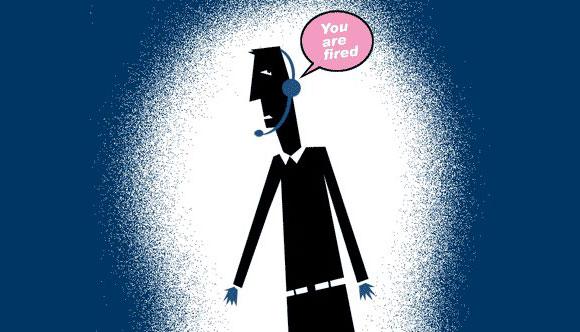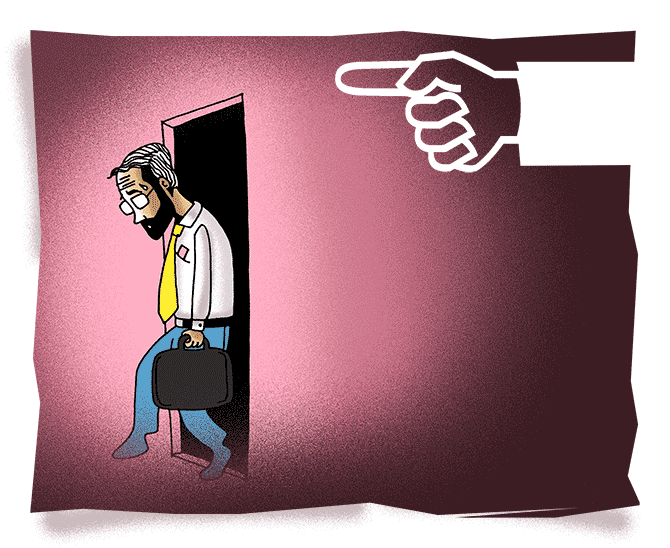Young professionals who lost their jobs tell Rediff.com's Divya Nair how they reclaimed their lives.
Illustration: Dominic Xavier/Rediff.com

1. Don't be furniture
Liju Joseph*, 25, who worked as a media assistant without being paid for 3 months in 2015, says she loved her first job so much that she didn't bother to find out what was new or upgrading her skills at work.
"When the company was going through a rough patch, I was worried that our salaries were delayed, but I never expect to lose the job. I was too confident that I was performing well and things would improve."
"It was my first job and I had been working with the firm for over 5 years so I didn't want to quit. But when I was laid off, I realised I hadn't learned much on the job."
"When I appeared for interviews, I realised I did not have the skills required for the jobs that were available. I finally risked my career and worked at an advertising firm for another 3 months on the condition that I won't be paid a salary. I built my skills and reapplied as a media planner in an international firm and got selected."
"Initially, the salary wasn't exciting, but in 2 years, I proved myself and found my place in the team."
Liju's advice to young professionals: "Don't be too comfortable, or complacent at work. That makes you vulnerable and easy to be laid off. Find ways to attend workshops or courses outside of work. If you have a strong work profile and additional skills that add value to the organisation, the company may still find a way to retain you."
2. Be flexible
When Abhay Deshmukh, 34, secured an MBA in finance in 2007, he was immediately placed at a top IT firm in Pune. But a year into his company, in 2008, he was given the pink slip because they wanted to 'downsize the finance team'.
Abhay, who had worked as a marketing intern in his second year of graduation, immediately brushed up his CV and took up a job with a small fintech start-up in Bengaluru handling sales and marketing targets.
In the last 8 years, he has worked with multiple start-ups in Bengaluru, Hyderabad, Pune and Mumbai to expand his skills and stay relevant.
His advice: "Don't be rigid. Be flexible to change. If I hadn't risked moving to Bengaluru or working with smaller start-ups, I would have been jobless. So, don't be afraid to change your path or take on something smaller or riskier. Be open to learn new skills, ideas and experiences."
3. Be relevant
After Samiksha Nair, 38, lost her cabin crew job in 2007, she was jobless for over a year.
"After six months, I realised I had no job or savings. None of the airlines were hiring and I had an education loan to pay off. From earning Rs 40,000 a month to zero savings, it was a downfall I hadn't expected," recalls Nair.
In 2009, she quit all dreams of flying again and turned instructor.
"I took up a part-time job working as an instructor at Frankfinn to replace a colleague who was on leave. Once I gained confidence, I applied to other institutes and focussed on grooming skills to train young professionals in hotel management and aviation."
Samiksha's advice is: "You must stay relevant in your job. No matter how young or successful you are, you have to constantly ask yourself that question -- Am I relevant, useful? Do I have enough experience or should I do more?"
"If you are in the service industry, some skills you learn on one job can be put to use in other industries as well -- like interpersonal skills, grooming, etiquette, English communication skills. If not airlines or hotel management, you can always work as a trainer or instructor and still stay relevant."
"Most important, watch out for the signs and move on before it is too late. There is nothing like a bad career option. In my case, I couldn't afford to spend on skilling myself so I decided to find an alternate job that thankfully, helped put my skills to good use."
4. Have a backup plan
Former journalist Sridhar Ramakrishnan, who quit his job to become an entrepreneur, feels one should always have a backup plan.
He now prepares youngsters to be job-ready.
"Develop a second line of income that does not clash ethically and legally with your main job," he says.
"It need not be a business. It could even be a hobby or passion that you could develop later. You can keep it on slow burn, and keep many such passions on slow burn, only to turn to when your main job is in jeopardy."
* Name changed on request.
Did you lose your job? Know someone who has been laid off?
Do tell us how you coped and what you learnt from the experience.
Please write to getahead@rediff.co.in (Subject: Layoff Stories) along with your NAME, AGE, LOCATION. We'll publish the responses on Rediff.com.










